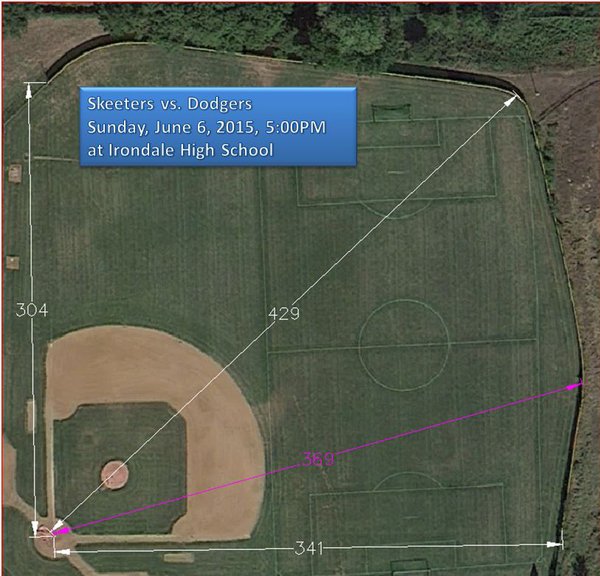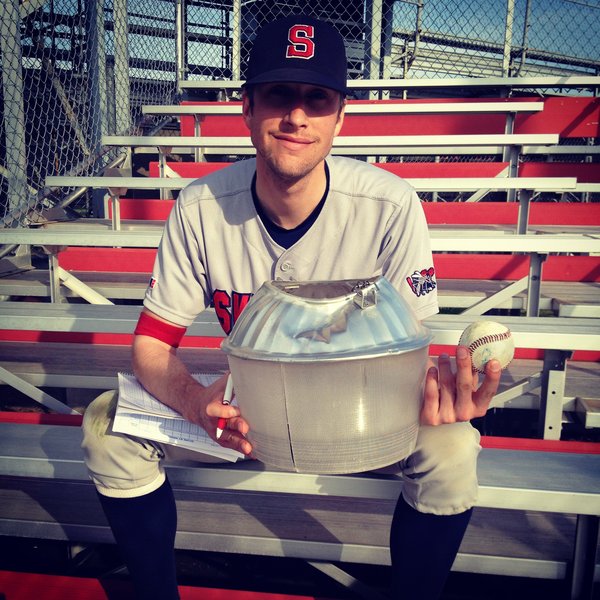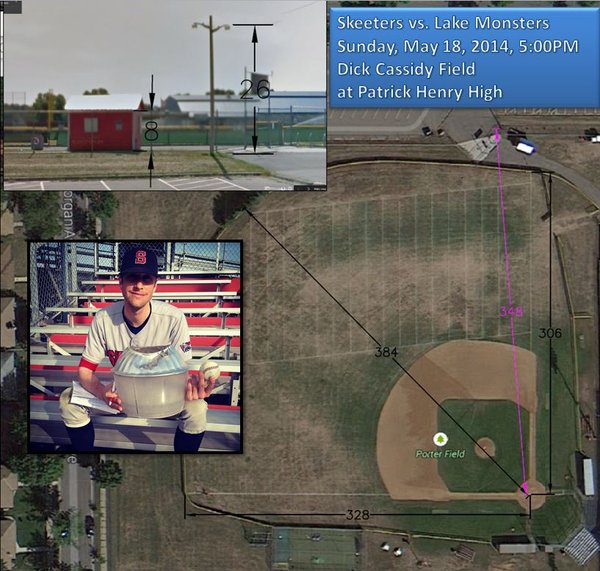"S" is for Skeeters
In honor of the 2025 TCMABL 35+ champions. (With apologies to Ogden Nash.)
As reported by: Chuck Terhark
A is for Allen,
Who Phils every stat
With his ever-fresh legs
And his ludicrous bat.
B is for Bill
Whose charms we won't dwell on
And also for Barb
Our bringer of melon.
C is for Corcoran
Those pitchers must hate you!
The home runs are fun, sure
But how 'bout that 8-2?
D is for Dan
whether Smolik or Genrich
A nickel per highlight
And I coulda been rich.
E's for Eleven
Now batting: Seth!
Blink and he's standing
On third, out of breath.
F is for Frerichs
His praises, you've sung 'em
Great Skeeters infielders?
"Chief" is among 'em.
G is for Grill
A consummate winner
Eats grounders for breakfast
Cooks 'Slingers for dinner.
H is for Home Runs
Launched into the sky; let's
Pause here a moment and
Give thanks to the Pilots.
I is for innings
The way our pitchers eat 'em
No matter the rival
Our pitchers beat 'em.
J is for Johnson
His swing smooth as suede
The mightiest Casey?
A case could be made.
K is for Strikeout
The absence of hitting
It's also for Ken
A fact I find befitting.
L is for Locks
May Bob never trim his
When he's on the mound
Hitters swing, miss, and grimace.
M is for Manager
Ours is named TEG
His forearm's circumference is
Same as my leg.
People ask "How's this team
So good? And why?"
The Skeeters are Skeeters
'Cuz TEG is our guy.
N is for, naturally
Both our Nate S's
Need a laugh? Check out
Both Nates' OPS's.
O is for Outfield
Apt epithet
Hit a ball out to Phil
And "out's" what you'll get.
P is for Potions
A COW boy named Robert
Remember his homer? Boy,
That ball was clobbert.
Q is for Quit
Definition: unknown
No blue? No matter
Let Josh call the zone.
R is for Randy
Bespectacled Schmidt
He's not just eye candy
He also can hit!
S is for Skeeters
Quintuply engorged
On the blood from the vein
Whence victory's forged.
T's Triple Play
And who woulda thought
It would happen again,
On camera or not?
U's Undefeated
And Unprecedented
A season historic
A legacy cemented.
V is for video
Mudslinger's bane
I guess we will just have to
Turn three again.
W is for Wangler
Whose name's now a noun
It means "one who wangles"
Which means "mows guys down."
X is the X
In the number "5x"
For how many times we've worn
Gold 'round our necks.
Y is for Yes
Which answers the question
"Which Skeeters hitters
Give foes indigestion?"
And Z is for Zeroes
Whose virtues are many
So many, in fact,
I won't single out any.
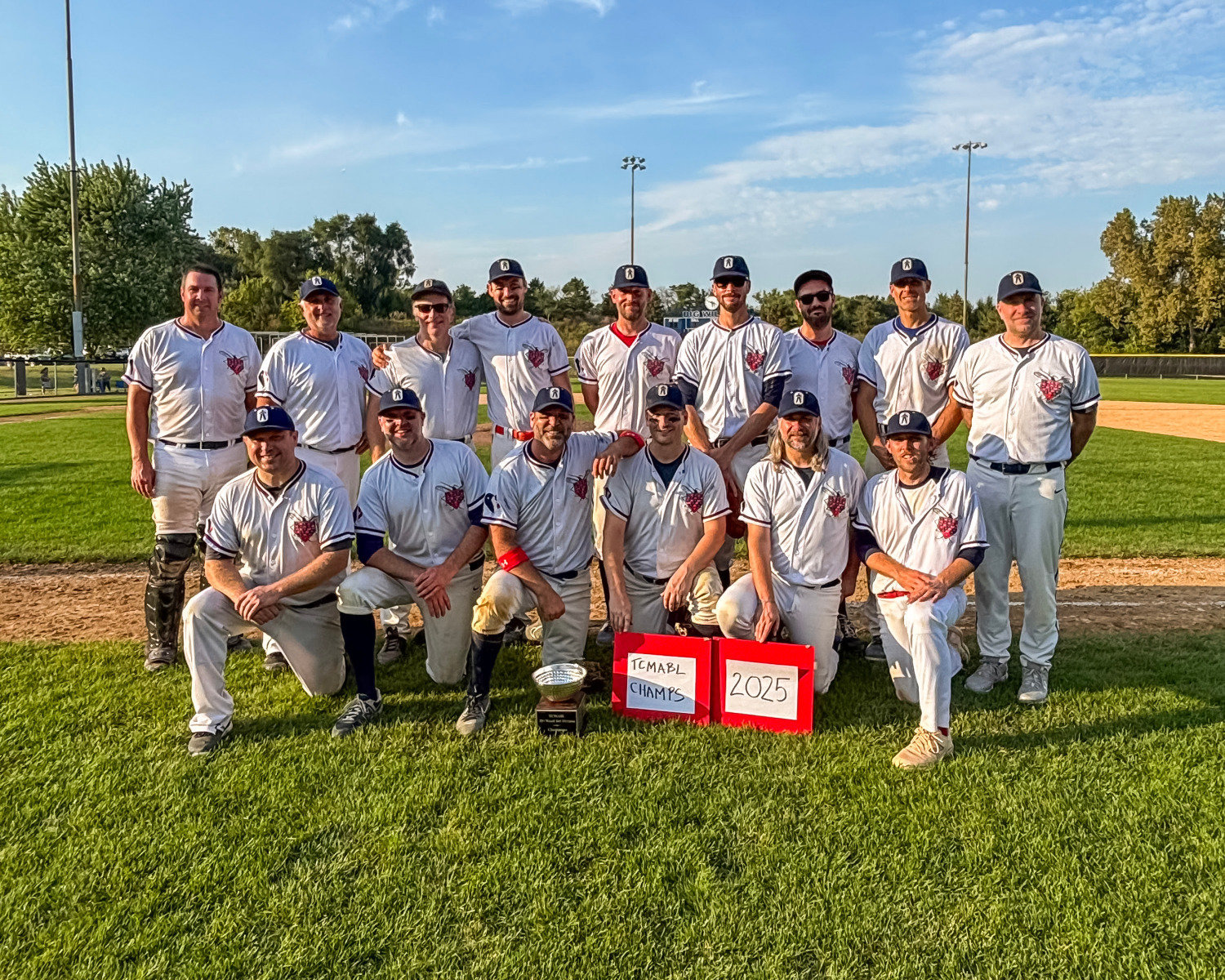
Skeeters vs. Mudslingers
Sunday, July 27th, 2025 5PM
Northeast Athletic Field

An Interview with Skeeter Third Baseman Dan Smolik
As Reported by: Tom Corcoran
Dan Smolik, perhaps the most humble member of the Skeeters, ignored repeated attempts to schedule this interview. After many failed attempts, I invited him over by pretending I had just ordered his favorite pizza, Mama's Pizza, and had enough to share.
Dan enters the room and takes a look around
Corcoran: Danny Doubles! Thanks for joining us, unfortunately there will be no pizza. I just want to talk about your home run.
Smolik: You gotta be kidding me.
Corcoran: Is it true that the morning of your homerun, which just so happened to be against one of the toughest pitchers in the league, you woke up at your usual 4am and went for a 7 mile run, and then followed it up with a day of swimming with your family?
Smolik: I gotta get outta here.
Dan gets up and leaves
Corcoran: That concludes today's interview, we thank Dan for his time
Skeeters vs. Mavericks
Sunday, July 13th, 2025 5PM
Northeast Athletic Field
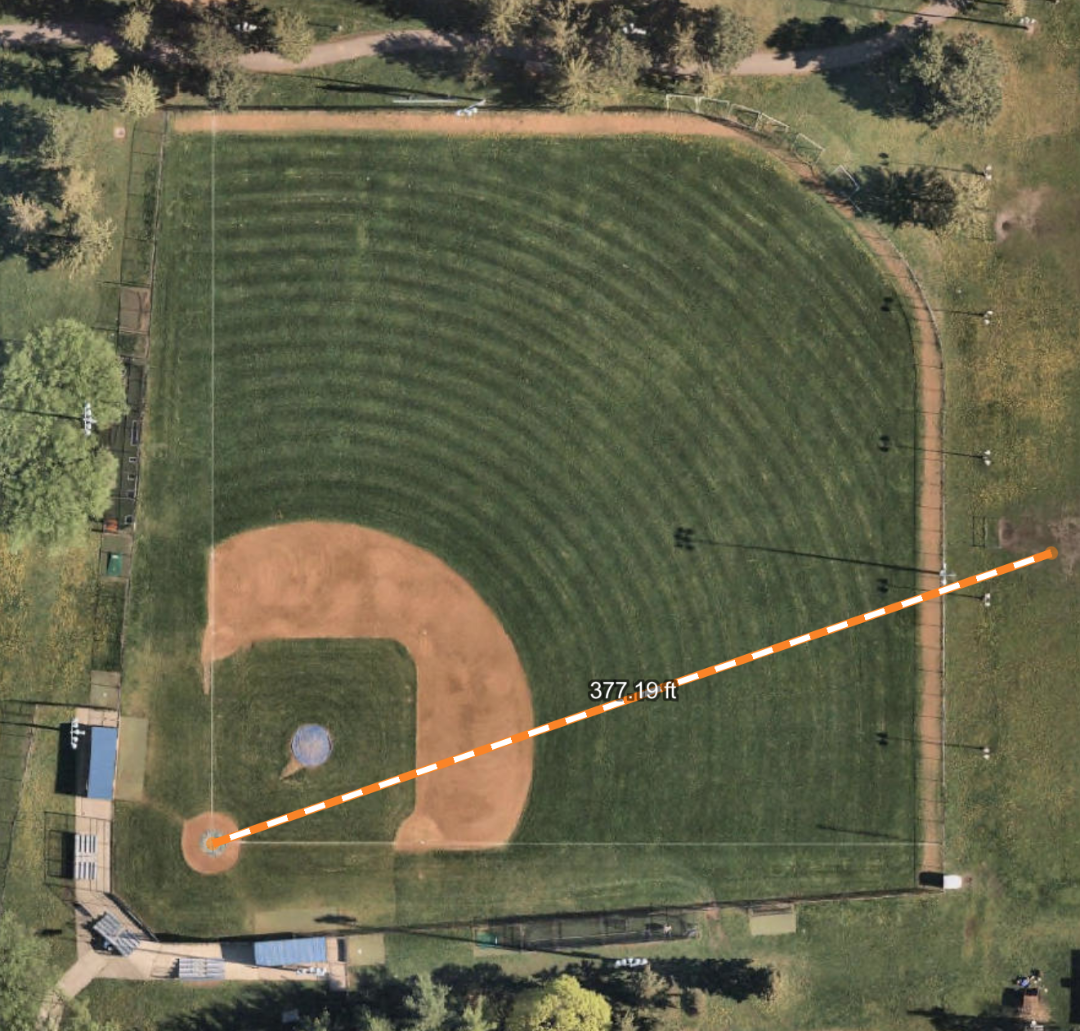
An Interview with Skeeter First Baseman and LHP Relief Pitcher Rob Jones
As reported by: Rob Jones
Good day, Skeeter homepage readers. My name is Rob Jones, and I’ll be guest-hosting this interview today while Tom Genrich is off on a Tomcat assignment. My hope is to honor this institution Mr. Genrich has built while I keep his chair warm, shoes taped, and do my part to record an official Skeeter story. Rest assured, dear reader, we do expect Mr. Genrich back later this summer for what is sure to be an electrifying Dan Smolik interview. Please continue to refresh Skeeter socials and this very webpage for updates on his forthcoming dispatches.
For today’s interview I sat down with Rob Jones. A founding member of the Skeeter franchise, Rob Jones may well have been the inspiration for this very tradition of Skeeter Homerun Write-ups after his light-pole-smashing blast in 2014. But his history goes back even further: Rob Jones emerged in 2007 during the Skeeters’ inaugural game, batting seventh and playing third base. He would soon migrate to first base where he quietly accumulated more career innings than any Skeeter not named Tom Genrich. This makes Rob Jones, definitionally, one of the weightier compilers of personality on the Skeeter roster.
We had a great conversation touching on record keeping, the role and regard for the author, the nature of observation, personal glory and grievance, and the point of it all.
With that said, let’s get right into it. Without further ado, it is my distinct pleasure to now present the Rob Jones transcript.
Rob Jones: Thank you for the invite. But I’ll admit – this feels odd.
Rob Jones: You are very welcome. Odd how?
Rob Jones: This isn’t how it’s normally done right? One player speaking in two voices? That’s odd.
Rob Jones: Um, I am not authorized to pull back Mr. Genrich’s robe here, so let’s say: no, this is not typically how we have done this. But even if I grant you that this is “odd”, “odd” would seem to suit a man of your unique physical proportions would it not?
Rob Jones: We? Are you really going to do the whole thing like this?
Rob Jones: Like what?
Rob Jones: You interviewing me as you in TEG’s voice?
Rob Jones: Well, I am only the guest host, and Mr. Genrich did leave behind lengthy production notes and a pre-interview dossier. I feel it’s important to honor the spirit of his intentions when working in his space. At least that’s the premise we’ll need readers to accept if this is going to succeed.
Rob Jones: So, TEG is asking us to observe the “spirit” of his intentions again. It always comes back to that, doesn’t it?
Rob Jones: Well, he, and I guess I, would argue it’s impossible to understand any work’s meaning without contemplating the artist’s intention or “spirit”. It is as true of a great novel as of a homepage write-up, or even a rule-set governing minor-league fantasy baseball rosters. Wouldn’t you concede that the spirit informs the message – from an epistemological perspective at least?
Rob Jones: No. I don’t think many would concede that. Whether an artist, interviewer, or fantasy baseball commissioner, the creator’s intention is ephemeral. Any meaningful work must be able to stand on its own without annotation. Context is a crutch. The author is dead. True art must be durable.
Rob Jones: Well, this then will not be that.
Rob Jones: Obviously.
Rob Jones: The notes warned that you’re prone to digression. Shall we get to the topic at hand?
Rob Jones: Please.
Rob Jones: Wait…I have a good transition for a quick aside.
Rob Jones: Go ahead.
Rob Jones: Speaking of durability, one of the most consistent aspects of your play is how it evokes discussion of resemblance to various members of the animal kingdom.
Rob Jones: …hmm?
Rob Jones: Yes – on the field you’ve been compared to a stork, a camel, an octopus, a pelican, a bull, a flamingo, a praying mantis, a great white heron, and a giraffe, to name just the often repeated.
Rob Jones: Yeah, wait… a bull? I can’t say I’ve heard that from TEG.
Rob Jones: It says here: Bull – a mammal incapable of supporting calf growth.
Rob Jones: I see.
Rob Jones: Body humor!
Rob Jones: Yeah.
Rob Jones: Ha! Yet you still choose to wear your socks to the knee? Odd indeed.
Rob Jones: So I’ve been told. Can we get to the point?
Rob Jones: Certainly! We wanted to reach out as soon as we heard of your most recent home run. I even felt a sort of personal desire to ensure your feat was recorded in this space, even if Mr. Genrich remains otherwise occupied. I observed you hit your third Skeeter home run on July 13, 2025, against the Mavericks.
Rob Jones: Thank you! Yes, that’s right.
Rob Jones: And during your age 47 season! We believe this to be the oldest home run in the Skeeter records.
Rob Jones: Huh. I’ll remind TEG of that when he’s back.
Rob Jones: Apropos of your age, they say a box score is nothing more than a tombstone. Mr. Genrich’s mission here in this space, however, is to rescue the memory itself – the wisp around moment that might one day matter more than the number.
Rob Jones: That gives TEG a lot of credit. Doesn’t it seem just as likely that he, as the primary author here, wants to be the one to tell the story?
Rob Jones: Maybe he desires to be the one to describe the meat on our bones. But one can’t contest the measurable facts. They are simply there on our tombstones – or for us today, in the box score.
Rob Jones: I suspect many Skeeters once thought like that. However, the dugout chatter these days often discusses the box score as the sort of box holding Schrödinger’s cat. You see, in “Corcoran’s Book” a play can exist as both a hit and an error – a win and a save. In that reality it falls to these write-ups to remind us if we were ever actually alive or dead.
Rob Jones: Yes, yes. So says Phil. But in this case the box score is accompanied by a game summary. The story for that night describes a “perfect swing,” launching the ball “over 350 feet” beyond the Stan Cyson right-center field fence. What else do you recall about that play?
Rob Jones: I appreciate the opportunity to restate my memory for posterity as many of those memories have already begun to fade. I reviewed some of my contemporaneous notes to prepare for this interview. In a text exchange with absent teammate Tom Corcoran, I recalled the pitch was a low-middle fastball on a 1-1 count. I then estimated the ball left my bat at about 90 mph with a nearly ideal launch angle of roughly 28°.
Rob Jones: That seems awfully specific. I’m skeptical you could estimate that accurately in real time.
Rob Jones: Well, we have had extensive looks at our batted ball stats during our Friday night Hit Club gatherings. But fair. So let me just state it, for the permanent record: Rob Jones hit a home run for the Skeeters, estimated at 94 mph off the bat, 28° launch angle, traveling 377 feet.
Rob Jones: Did you just pad the numbers mid-interview?
Rob Jones: Physics are correctly calculated, pending an adjustment for humidity. It will be hard to disprove any of the rest of it now.
Rob Jones: Okay, but even if that’s the line to be remembered, as Mr. Genrich says, “Every stat line is a trophy case, and every trophy case is eventually offered up at a garage sale.”
Rob Jones: I doubt he’s ever said that.
Rob Jones: I think he thinks it… about YOUR stats at least. So, let’s move on to the other listed topics. Mr. Genrich left several more questions in the dossier – shall we get into those?
Rob Jones: I thought this was to immortalize my home run.
Rob Jones: Apparently not just. Much of the rest of the outline seems to concern the timeliness of your so-called accounting department.
Rob Jones: I understood this to be a puff piece.
Rob Jones: We can skip over that one for now if you like, but there are more in that vein. We still intend to cover your unusual packing habits, your refusal to greenlight team airfare, the suitability of your yard to host a team event, the Skeeter Whites uniform design debacle, your throws to second on pick-offs, why your body moves like that when you throw, the health warnings on your various muscle rubs, your politically inconvenient car choices, why you run like that, and finally – I just have the words “bulk lemon juice.”
Rob Jones: No one wants to read a list of TEG’s grievances and diminishments.
Rob Jones: These interviews aren’t really designed to prioritize audience interest.
Rob Jones: Then why are we doing this?
Rob Jones: You mean this interview, or the greater Skeeter experiment?
Rob Jones: “Why are we doing the Skeeters at all?” I think that’s the context we needed to frame this interview.
Rob Jones: So now you’re arguing in support of context in art criticism?
Rob Jones: Maybe I haven’t yet convinced myself. I know that it’s said that “We have art in order not to die of the truth.”
Rob Jones: You’ve resorted to quoting Nietzsche? That is pretty bleak.
Rob Jones: The quote or the fact that I quoted him?
Rob Jones: Both, I suppose. It comes off like you’re trying on the persona of the man you wish you were.
Rob Jones: I am a 35+ rec league baseball player.
Rob Jones: Indeed…and it looks like that line hit our word count! I can’t thank you enough for stopping in today. This has been Rob Jones, filling in for Tom Genrich, with Rob Jones.
Thank you to you dear reader for your assistance in memorializing this matter and, as always, remember that we only ask what it means when we already fear that it doesn’t.
Rob Jones’s Note: The views expressed by Rob Jones (and Rob Jones) are not necessarily shared by Rob Jones or the Skeeter organization, though they were, in fact, submitted by Rob Jones and are thought to represent what Rob Jones believed to be the truth.
Skeeters vs. Bullies
Sunday, June 15th, 2025 5PM
Fernbrook Park

An Interview with the Sometimes Skeeter, Nate Stark
Genrich: Of my first guest, it’s been said that in another life, he would have made an excellent small-town sheriff. If there is to be a dustup at the local corral, one imagines sheriff Stark, steadfast and unflappable, emerging with his authority intact and his wits — and the ruffians — secured. But on his watch, surely it wouldn’t come to that. There is more Andy Griffith to the man than Wyatt Earp, and one pictures a town under Nate Stark’s care as a place shaped in his image: wholesome and decent, where neighbors treat one another with patience and empathy, where order is upheld not by force of arms but by the strength of his character, and where his Dad voice compels even the most stubborn cat to come down from a tree forthwith. One believes the citizens of this Mayberry would count themselves lucky to have him. Whether he donned a ball cap and took the field with the local nine or not.
But we are not here to discuss Nate Stark the sheriff. We are here to discuss Nate Stark the baseball player. Specifically, we are here to explore his storied career in the Twin Cities Men’s Adult Baseball League. First with the NE Nine, and now with the Irish, Nate Stark has been a fixture atop the regular season 28+ pitching and hitting leaderboards. His single-season numbers are impressive. The accumulation of those numbers over a long and consistent career is more impressive still. As to the question of whether he’s been better on the mound or in the batter’s box, the answer one is looking for is: "Why choose?" As Shohei Ohtani reminds us, mastery need not be singular.
Before we begin, I should acknowledge that my abiding friendship with today’s guest will, inevitably, color our conversation. But to those who value the honest rigor of these interviews, rest assured: Nate Stark’s accomplishments on the field and his pedigree as a TCMABL champion will prove so vividly technicolored that any artificial coloring on my part will scarcely register.
I should like to begin by asking my guest if he has yet reconciled his customary, which is to say transcendent, level of play with his TCMABL Skeeter debut.
Stark: Thank you. That was all very nice. Maybe a little much. I need to make a small correction.
Genrich: And I will be happy to entertain that correction. But before we dive into your body of work, which I very much look forward to, let's take a moment to acknowledge the elephant in the room: Your debut as a Skeeter could have gone better. Fair to say?
Stark: Fair to say.
Genrich: A matchup of two undefeated teams. You batted twice. The first at-bat was a strikeout with runners on. The second was an infield fly call with even more runners on.
Stark: After the game someone pointed out that with that infield fly I managed the only form of contact that makes it impossible to reach base.
Genrich: That was me. We laugh because the performance was so out of character. I've done the research and discovered that your debut was, indisputably, the worst TCMABL Skeeter debut in Skeeter history. In fact, it ranks right there among the worst TCMABL team debuts in the 30-year history of the league.
Stark: As I told you after the game, I don't think it could have gone any worse.
Genrich: Literally.
Stark: No, not literally. Worse things could have happened.
Genrich: You think so? I mean, we've got so much material to get to and I don't want to dwell on this. Let it suffice to say that I spent my 40 minute car ride home trying to come up with a way it might have gone worse and came up empty.
Stark: You couldn't catastrophize something worse happening on a baseball field? You? I find that very hard to believe.
Genrich: It wasn't just me. I got Dan Smolik on the phone and we workshopped it. We visited some pretty dark places.
Stark: I need an example.
Genrich: I really want to get into your numbers. But okay. You want a scenario involving the paramedics or the police? Or both?
Stark: Maybe something a little lighter?
Genrich: Good. How about a humiliation scenario? Your first at-bat where you struck out with runners on base. Suppose instead you top one to the pitcher. And then you have a bowel movement. Accidental, in this scenario.
Stark: There's a scenario where the movement isn't accidental?
Genrich: As a reader of these interviews, you're aware that Skeeters inject ants into their pants to make themselves run faster. There's a scenario where you purposely void as a cap-tip of sorts.
Stark: Yeah, well that's disgusting and would never happen. And both scenarios are definitely worse.
Genrich: Are they though? At least you've given yourself a chance to reach a base. And you wear sliding shorts so you would have containment.
Stark: You don't think the other team notices something is off as I'm sprinting to first?
Genrich: Well. You're not sprinting, are you?
Stark: What do you mean.
Genrich: I mean you don't really sprint.
Stark: What do I do?
Genrich: I don't know. Lumber?
Stark: I lumber? So now it turns out that I'm the elephant in the room?
Genrich: Nate, please. "Nate Stark runs like an elephant" sounds like a schoolyard taunt. You've never heard me say that. And I'm sure you didn't hear it growing up either.
Stark: No, that was never said.
Genrich: No doubt because you were smart enough to deny your classmates the chance. That speaks to a self-awareness that has only deepened over time. Which is why I don’t have to tell you that even now, your movements can lack a certain coherence.
Stark: It's amazing that I can remain upright long enough to swing a bat.
Genrich: I don’t think it’s quite as bad as that. Also, and to your credit, look how far you've come. You were quite uncoordinated as a child. All floppy and spastic.
Stark: You didn't know me as a child.
Genrich: One pictures a marionette handled by an inexperienced puppeteer who, mid-performance, is being stung by a bee. Repeatedly.
Stark: I feel like that marionette in this interview.
Genrich: Given how spiteful kids can be, I imagine you avoided running across the playground at all costs.
Stark: You've got one thing right in all of this: Comparing someone to an elephant is extremely childish.
Genrich: That's exactly right, Nate. And I'm uncomfortable with the comparison in other ways. For one, in terms of biomass, you're barely a fraction of an elephant. Also, elephants have been known to paint. From what I’ve seen, your artistic side is lacking.
Stark: When have we been in a situation where you would see my artistic side?
Genrich: But if we want to be elephant completists here, we must acknowledge that an elephant is heavy-footed to be sure. Strong yes, but powered exclusively by slow twitch muscle fiber. A gait that says "I'll get there eventually". Also like you, an elephant can recognize itself in the mirror.
Stark: That elephant is probably thinking, "Here’s an elephant who needs to get out of this metaphor before it collapses on him completely.”
Genrich: What the elephant is thinking when it sees itself in the mirror who can say for sure. But having watched you attempt to track down a lob into the back corner of a racquetball court, I suspect the elephant is struck by the same thought I am.
Stark: Which is what?
Genrich: Here's a fellow not constructed to maneuver into and around tight corners.
Stark: And yet you've never come close to beating me in squash.
Genrich: But let's be clear: An elephant's total lack of physical grace doesn't diminish the greatness of the elephant. I'd hasten to say the same thing about you.
Stark: Thanks for that.
Genrich: Although I want to say the first time I faced you in a game I hit a double. Do you remember that?
Stark: You've never hit a double off of me.
Genrich: Right. So among your more affirmative elephantine aspects, we'll go ahead and exclude a good memory from that list.
Stark: Collapse complete. The elephant didn't make it.
Genrich: What's that?
Stark: Never mind. I'll tell you what I do remember. When I'm filling out a lineup card, I do remember the jersey numbers of the teammates I’ve played with for years. And I remember that tournament in Palm Springs when we stopped for ice cream at that really fancy place — all small batch, super gourmet stuff. What did you get?
Genrich: I don't remember.
Stark: You got a vanilla shake.
Genrich: A classic flavor.
Stark: I also remember managing the TCMABL All-Star Game a few years back and bringing myself in to face you. Do you remember what happened in that at-bat?
Genrich: Well, I struck out. Of course I was badly distracted with my own All-Star managing duties. As you know, I take my managing duties seriously.
Stark: I don't know that. I think that would come as news to anyone who has ever played for you.
Genrich: I'm a little surprised you would bring up that All-Star moment. Your career is full of so many shining moments. But it must be said: the infamous Stark Intrusion was not one of them.
Stark: What do you mean? I didn't even warm up. I went from the dugout to the mound to striking you out.
Genrich: Exactly. The game was close and your pitcher was in total command. Entering the game without a proper warmup put your team at risk. The whole thing caught me off guard — not just the move itself, but the mindset it revealed.
Stark: What mindset was that?
Genrich: Personal glory over team success.
Stark: Now hold on. We both know that Bob Gordon says that's your mantra.
Genrich: Yes, but I don't know where that's coming from. Given the run of Skeeter championships, my mantra would have to be something like "Team Success and Personal Glory." Or better: "Team Success Through Personal Glory."
Stark: Some championships are won because of players. Some are won in spite of players.
Genrich: A fascinating dichotomy to be sure. But let's not get sidetracked. This discussion is about you.
Stark: Is it? I feel like it's been mostly about elephants.
Genrich: Your TCMABL championship season. Let's talk about it.
Stark: This is the correction I wanted to make. I haven't won a TCMABL championship.
Genrich: But seriously.
Stark: Seriously. I haven't won a TCMABL championship.
Genrich: Of course you have.
Stark: I haven't.
Genrich: You won that one with the NE Nine.
Stark: That happened before I got there.
Genrich: No it didn't.
Stark: Yes it did.
Genrich: You haven't won a single TCMABL championship?
Stark: No. Have I ever claimed to have won a TCMABL championship?
Genrich: Yes. Or maybe not? I guess maybe not?
Stark: I haven't won a TCMABL championship. Is this a problem?
Genrich: Well. I don't know.
Stark: What do you mean you don't know?
Genrich: I mean, typically, I only hang out with winners.
Stark: Are you saying you don't want to hang out with me anymore because I haven't won a TCMABL championship?
Genrich: We can still hang out if you want. Just ... maybe not in public.
Stark: I don't want you to do me any favors. You certainly aren't doing me any favors with this interview. When do we start talking about all of the shining moments?
Genrich: I think I need to go make some ground turkey now.
Stark: That's it?
Genrich: Well no. I'll probably have a bowl of cereal later.
Stark: I mean the interview. That’s it for the interview?
Genrich: I'll grant you that when we opened with the whole sheriff Stark thing I didn't think we'd end by talking ground turkey and cereal.
Stark: Phil tried to warn me about doing this interview.
Genrich: I do have to say, I’m very pleased with the exposition in that opening. Some fine narrative work there. I think I'm going to want to publish this
.
Stark: So, personal glory over interview success. That tracks. Although I wasn't the one diminished by our exchange.
Genrich: Really? After our back and forth, I can't say that I follow.
Stark: After our back and forth, I can't say that I'm surprised.
Skeeters vs. Mudslingers
2024 TCMABL 35+ Championship Game
Saturday, September 14th, 2024 2 PM
Big Willow Field
2024 Skeeters Baseball Season Recap: A Year of Triumph and Transformation
As reported by: Rob Jones
The 2024 baseball season for the Skeeters, a small amateur team from Minneapolis, Minnesota, will forever be remembered as a remarkable tale of grit, growth, and glory. Led by the enigmatic Coach Tom Genrich, the team overcame early adversity, skepticism, and doubt to capture the championship in the most competitive 35+ league in the state and the hearts of a baseball-loving community.
At the start of the season, few could have predicted the Skeeters' eventual success. Coach Genrich arrived in town with a mysterious past, having been away from coaching for several years following an undisclosed incident. His tough, unorthodox methods immediately put him at odds with the townsfolk and even his own players. In Minnesota, where baseball is a beloved summer pastime, Skeeters fans were used to a more traditional approach to the game. Genrich’s insistence on teamwork and fundamentals clashed with their desire for a flashier, individual-focused style of play.
Early in the season, the team struggled. With just a handful of players and the unexpected resignation of a key assistant coach, Coach Genrich had to instill discipline and bring the boys together as a cohesive unit. His focus on pitching, fielding, and conditioning began to bear fruit, but not without resistance. Some parents and boosters were so dissatisfied with his methods that they called for his removal. In a heated town meeting, Coach Genrich’s integrity and the team’s growing bond helped him survive a close vote of no confidence.
A key turning point for the Skeeters came with the return of their star player, Rob Jones. The reserved and talented Jones had been sitting out the early part of the season, disillusioned with the game after the death of his former coach. But when Jones finally rejoined the squad, everything changed. His presence brought confidence to the team, and their batting lineup began to thrive. Known for his ability to deliver clutch hits in pressure situations, Jones quickly became the team’s most reliable player.
As the season progressed, the Skeeters began to gel. Despite their small roster, they became known for their tenacity, often outplaying larger and more experienced teams. Under Coach Genrich’s guidance, the team embraced a selfless, team-first mentality focused on disciplined pitching, smart base running, and executing plays to perfection. They shocked bigger teams in the state tournament, earning a trip to the state finals in Minnetonka.
Throughout the season, one of the most inspiring stories involved the underdog player Tom Corcoran, a boy with limited natural talent but endless heart. In critical moments, Corcoran’s contributions, particularly from the pitching mound and with a timely bunt in 2023, were crucial to the Skeeters' success, reminding everyone that effort and heart often make the difference.
The state championship game was the culmination of the Skeeters' journey. Facing the heavily favored Mudslingers, a perennial powerhouse from a much larger city, the game was a fierce battle with neither team able to pull away. In the closing moments, with the game tied, the Skeeters had a runner in scoring position. Coach Genrich signaled for a play, but Rob Jones, calm under pressure, confidently said, “I’ll drive him in.”
And drive him in he did. Jones’s walk-off hit in extra innings gave the Skeeters a stunning victory, sending the small community into celebration. The championship not only capped a storybook season but also represented the triumph of perseverance, teamwork, and belief. Coach Genrich and his team had shown that with hard work and heart, even the smallest of teams could dream big and succeed.
The 2024 Skeeters' season will be remembered as one of Minnesota 35+ baseball’s greatest moments, a testament to the power of belief and the strength of underdogs.
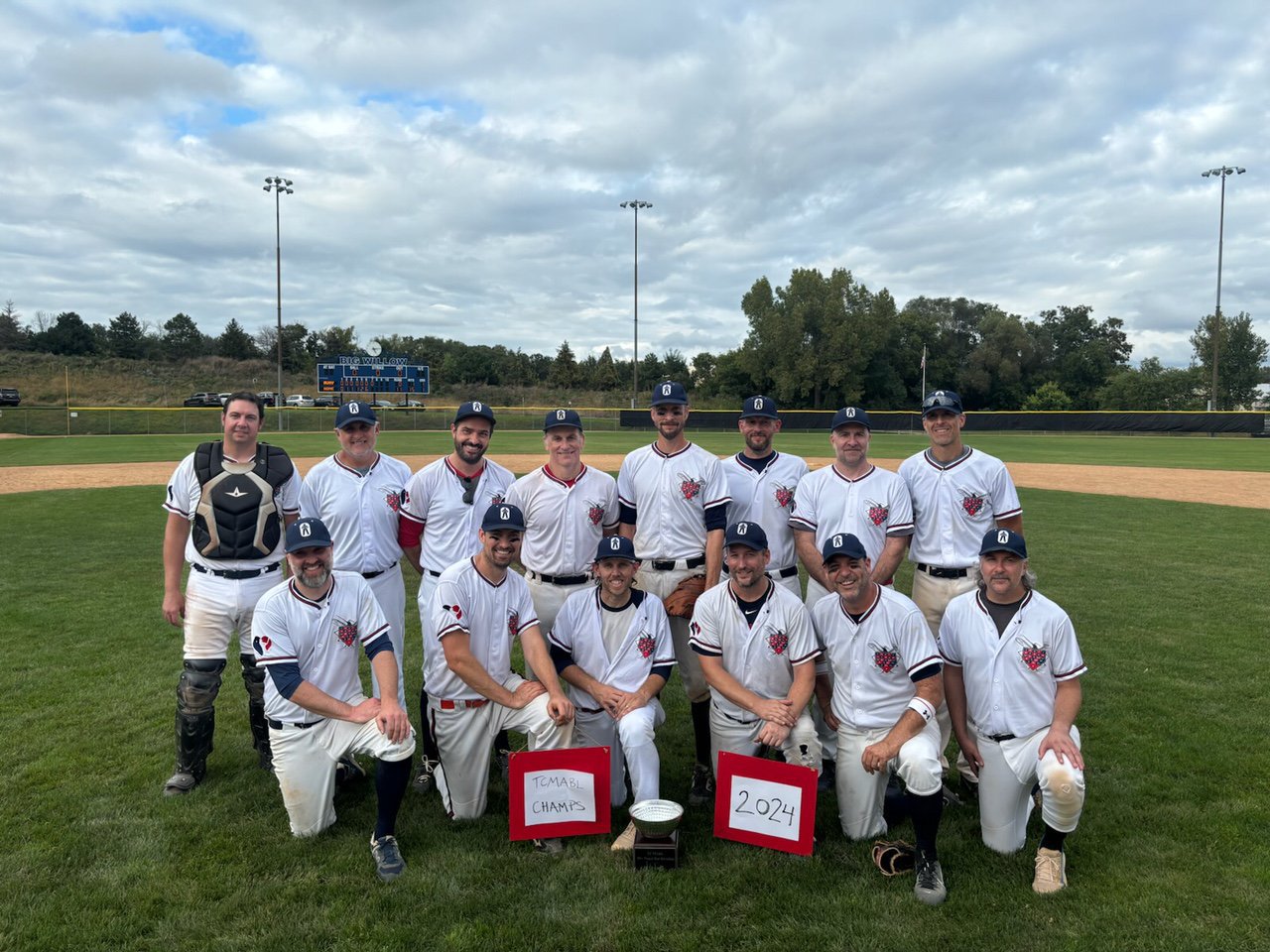
Skeeters vs. Pilots
Sunday, May 19th, 2024 5PM
Northeast Athletic Field
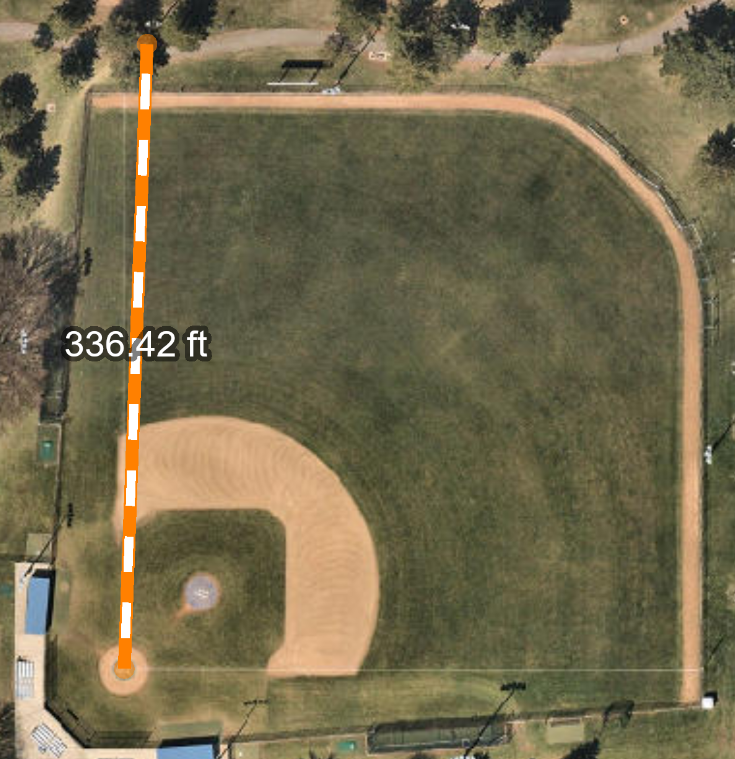
An Interview With Skeeter Right Fielder Chuck Terhark
Genrich: It's been said that the greatest trick the devil ever pulled was to convince the world that he didn't exist. That quote has been attributed to Baudelaire but is more recently known for its mention in The Usual Suspects, a movie about a criminal mastermind masquerading as the weakest member of the team.
My guest today will not be mistaken for the weakest member of any team. In his various incarnations he has performed as a writer, an editor, an entrepreneur, a man about town, a musician, a trivia host, a witty conversationalist, an amateur filmmaker, a family man, the president of a juggling club, and last but not least, a bona fide TCMABL home run hitter. Amidst the superabundance of evident talents and celebrated successes, it hardly seems possible that there should be any room left in his person for something more, much less something more that is also something sinister. And yet a closer look reveals that there is more to the man than meets the eye. With a first name as hearty as a handshake and a last name as sharp as a switchblade, one expects to discover in Chuck Terhark a study in contrasts. Instead, one discovers a study in dissimulation. A dissimulation whose purpose is to throw even the most dogged Javert off his cloven track.
I should like to begin by asking my guest whether he regrets hitting a home run, knowing that it would land him in the chair he is sitting in now.
Terhark: Cloven track? Really? But it's still nice to see you Tom. Is there a reason why I shouldn't want to be sitting here?
Genrich. Well, I understand why you would say that. But I can't help but suppose that the last thing you want is to be interviewed by an investigative journalist.
Terhark: Wait. Are you the investigative journalist?
Genrich: I'll let my Phil Allen piece speak to that.
Terhark: I think everyone knows that you just made all of that up.
Genrich: Dismissing a legitimate journalistic endeavor as "fake news" is the last refuge of the scoundrel.
Terhark: I actually agree with that.
Genrich: Do you? That’s a surprising statement coming from someone with a history of undermining the free press in the Twin Cities metropolitan area.
Terhark: I came prepared to say this. Though maybe not this early in the interview. I don't know what you're talking about.
Genrich: City Pages and The Rake. You wrote for them?
Terhark: I did.
Genrich: And now they are gone.
Terhark: They are.
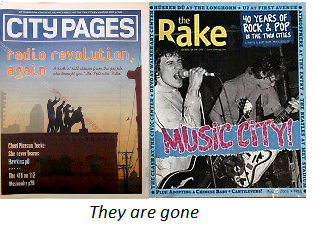
Terhark: But if you're suggesting a connection between me writing for them and them going away, I'll point out that I wasn't the only one who wrote for both publications. Others did too. Britt Robson may have.
Genrich: Don't give me Britt Robson.
Terhark: Why not?
Genrich: Anyone who cares about professional basketball as much as Britt Robson evidently cares about professional basketball is not a serious person.

Terhark: Seems like you care about amateur baseball as much as he cares about professional basketball.
Genrich: And then there's the mustache.
Terhark: What mustache? My mustache?
Genrich: All the great villains have mustaches.
Terhark: Is that true? I don't think that's true.
Genrich: Adolf Hitler. Joseph Stalin. Saddam Hussein. Joel Osteen, before he shaved it off.

Terhark: So I'm a villain because I have a mustache? Santa Claus has a mustache. Is he a villain?
Genrich: Is an inebriated, pub crawling Santa Claus urinating all over the place in public a villain? You tell me Chuck.
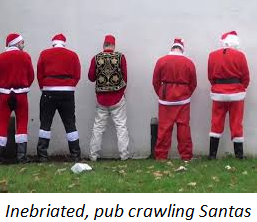
Terhark: How has an inebriated, pub crawling Santa entered the discussion? We should ask him to leave.
Genrich: You were once quite fond of inebriated, pub crawling Santas.
Terhark: If you're talking about the Santa pub crawl we did, that was a much smaller thing than the Zombie Pub Crawl. The Zombie Pub Crawl went on for more than a decade. And at no point did I hear about a public urination problem.
Genrich: In fact it was much bigger.
Terhark: The Zombie Pub Crawl?
Genrich: The public urination problem.
Terhark. The public urination problem associated with the Zombie Pub Crawl? I don't know where you're getting this from. I never saw any of that.
Genrich: Well, that's the nature of a public urination problem, isn't it? The problem moves along.
Terhark: I'm not following.
Genrich: If you drop to one knee as if to tie your shoe, and instead relieve yourself, it's not like a hen dropping an egg.
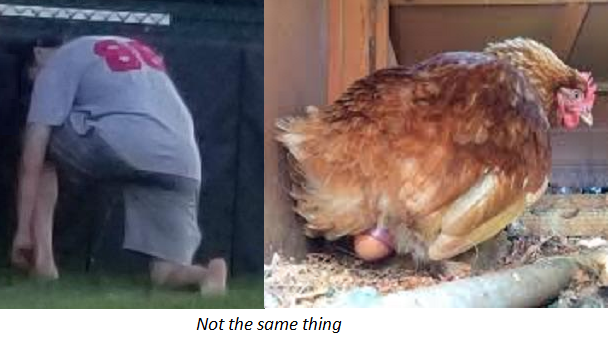
Genrich: That urinary event doesn't roost in place.
Terhark: It doesn't?
Genrich: Where do you think it roosts?
Terhark: In the ground?
Genrich: In 2012 your zombie gathering set a record recognized by Guinness. You may have set a record for public urination as well. Because the next day when Brian Gumbel was interviewing you about the crawl on Good Morning America, the Minneapolis and St. Paul Metropolitan area was waking up to a very different morning. A morning where public urination and urban runoff had transformed your triumph into a tragedy of the commons.
Terhark: I think you mean Bryant Gumbel. And he was on the Today show, not Good Morning America. I never spoke to anyone on either show. And I'm still not following you.
Genrich: Let me be explicit then. The Mississippi river was flowing yellow.

Terhark: That's preposterous. Even by the standards of your writeups that's proposterous.
Genrich: Try telling that to the folks in the Bayou. Clam beds were contaminated. Sturgeon were beaching themselves. Crab cakes were coming out yellow.
Terhark: So you're saying I did these pub crawls to pollute the Mississippi River?
Genrich: I didn't say that. I think that's putting too fine a point on it. I think of you as an agent of chaos, and I think you embraced the various Pub Crawls as catalysts for chaos.
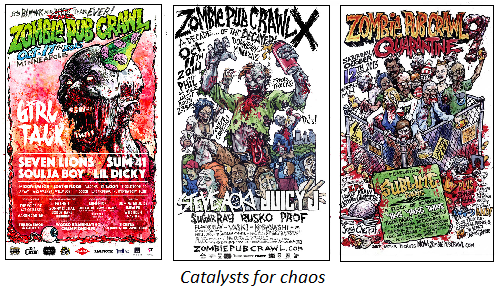
Genrich: Also, let's try to do this interview without putting words in each other's mouths.
Terhark: Alright with you if I ask a question?
Genrich: Shoot.
Terhark: If I'm an agent of chaos and the Zombie Pub Crawls were wrecking all of this chaos, why am I not still doing them?
Genrich: You know the answer. A bigger syndicate came along and made you an offer you couldn't refuse.
Terhark: That's actually true. We sold it.
Genrich: That's when you resolved that that would be the last time you would find yourself on the receiving end of an offer you couldn't refused. You called in some muscle from the juggling and jug band communities --
Terhark: I'm not a part of the juggling community. If there is even such a thing as a juggling community.
Genrich: You were the president of a juggling club.
Terhark: Back in college. That was almost 30 years ago.
Genrich: And of course you are a front man in the Como Avenue Jug Band. The literature shows that juggling clubs and jug bands are magnets for sociopaths.

Genrich: And so after being muscled out of the pub crawl racket, you gathered together some muscle of your own and embarked on a life of organized crime.
Terhark: I see.
Genrich: You see what.
Terhark: I see where this is going. And I can't believe you're actually making me say this: Trivia Mafia isn't a real mafia.
Genrich: I'll grant you that they don't look like mobsters.

Terhark: Because they aren't mobsters. We do pub trivia. At what point exactly did you decide that I am a Bond villain?
Genrich: Well, I first thought of you as a gifted writer. Then you started doing all of this other crazy stuff. When you started turning those wacky ideas into lucrative and successful money making ventures, I began suspecting that you were a creative genius. But then the FBI called.
Terhark: You've talked to the FBI?
Genrich: You have too. When they showed me what they had on you, I agreed to let an undercover agent join the team.
Terhark: I'm pretty sure there are no FBI agents on the Skeeters.
Genrich: You know him as Jeff Frerich.
Terhark: Are you telling me that Jeff Frerich isn't his real name? What's his real name?
Genrich: Jeff Freireich.
Terhark: That's basically the same name.
Genrich: Not at all. Freireich means "free realm" in German. It’s tough to go incognito as a protector of liberty when your name spills the beans. Frerich on the other hand is a nonsense name. Try typing it into a search engine. You can't.
Terhark: Why not?
Genrich: Because it's impossible to spell.

Terhark: Don't you get in trouble for revealing the identity of an undercover agent?
Genrich: Not if the FBI okays it. Which they have for use in your unauthorized biography.
Terhark: And who's writing my unauthorized biography?
Genrich: I am.
Terhark: Thought you might.
Genrich: Later this week I'm submitting an excerpt to the New Yorker for publication.
Terhark: No one is going to publish any of this. Least of all the New Yorker. No offense.
Genrich: I know one place that won't be publishing any of this.
Terhark: Where's that?
Genrich: The City Pages.
Terhark: Okay.
Genrich: Also The Rake.
Terhark: I should probably be going.
Genrich: Thanks for the time, Chuck. Next time I'll share some excerpts from the biography.
Terhark: Next time I'll stop at third.
Skeeters vs. Mudslingers
Sunday, July 9th, 2023 5 PM
Fernbrook Park
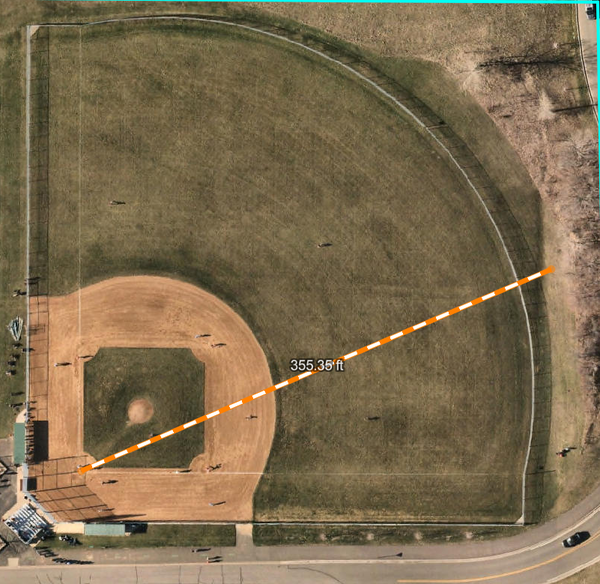
Genrich: What does that mean? To redefine the boundaries of the hand-held sign?
Genrich: Where does the sign end.
Genrich: Or an infinite number of times.
Allen: I figured the men's steam room was a good place to test my presentations against humidity. Turned out most health clubs wanted to claim that they had policies against being fully clothed in a steam room. And also bringing hand-held signs into a steam room.
Genrich: There was a physical altercation.
Genrich: And now we've come full circle. We set out on this journey hoping to understand what happened to your arm. I think we may have found our answer.
Genrich: Mission accomplished indeed. Phil, thanks for sitting down with me. Lots of interesting stuff came up in the background check that we didn't have a chance to get into. Hit another home run and we'll have to do this again.
Big Mike

Skeeters vs. Pilots
Sunday, June 26th, 2022 5 PM
Northeast Athletic Field
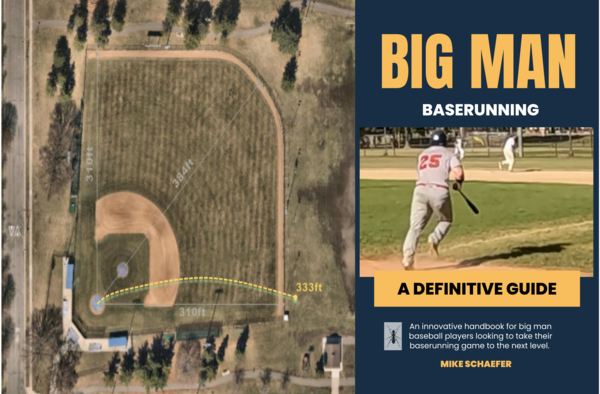
An Interview with Skeeter Third Baseman Mike Schaefer
In 2015, Mike Schaefer astonished the publishing world when his memoirs, Schaefer on Schaefer, climbed to number three on the New York Times Bestseller list. Seven years later and Schaefer has another surprise bestseller on his hands. Big Man Baserunning: A Definitive Guide promises to develop base running skills for the biggest of baseball players. I sat down with the Skeeter third baseman to talk about his book.
Genrich: So Mike, I read the book and enjoyed it. Though I'm not the target audience. Fair to say that you wrote the book and created the instructional videos for people who are yoked like you?
Schaefer: If the book was for you it'd be called Old Man Baserunning (laughs). And nobody says yoked anymore. But yeah, seriously, I wrote this for people who know their way around the weight room but need some help around the base paths.
Genrich: I thought we'd do this by sharing some clips from your instructional videos and talk about what we're seeing. Sound good?
Schaefer: Whatever you want Tom.
Genrich: Great. I want to start with a really innovative performance enhancement device that you've developed to help the big man accelerate out of the batters box. Let's take a look at a clip.
Genrich: So we're looking at you in this clip. You make contact, there is a little hop, and two steps later you are at full speed. Talk about how you got there.
Schaefer: Rabbits hop Tom. I'm not a rabbit. That "hop" as you call it is called a glute flex. As I go on to explain in the video, I'm clenching my buttocks so tightly that I'm actually lifting myself off the ground.
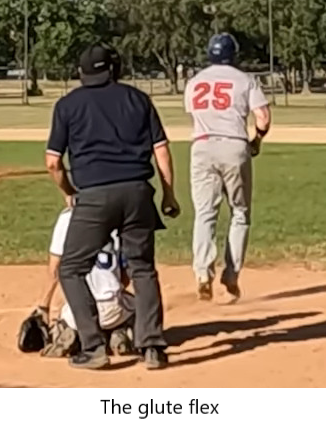
Genrich: And that glute flex is doing something else.
Schaefer: Yes. Tucked in between my buttocks is a tube full of ants. That glute flex pops the top off of that container.
Genrich: Spilling ants into your pants.
Schaefer: Let me tell you something Tom. When you have ants in your pants, you're thinking just one thing.
Genrich: What's that?
Schaefer: I have to get these ants out of my pants.
Genrich: And that's not happening until you get yourself around the bases and back into the dugout. The big man discovers a gear he didn't know he had.
Schaefer: That's right. Doesn't matter how many times you have ants in your pants. The next time you have ants in your pants will feel like the first time you've had ants in your pants.
Genrich: You're startled.
Schaefer: For a second. And then you go. You get to top speed in a hurry. Because you want to get away from the ants.
Genrich: Except that you can't. Because the ants are right there with you.
Schaefer: Inside your pants. That's right.

Genrich: Talk about the species of ant. Does it matter?
Schaefer: Well, generally speaking, the bigger the man, the more aggressive the ant. A carpenter ant will bite you and they work well enough for me. For an even bigger guy I'd recommend something like a fire ant.
Genrich: Can you go too big with the ant?
Schaaefer: The Brazilian army ant will really get after you. I tried them once and they almost gave me a vasectomy. I'd not recommend using them.

Genrich: Let's move on to the next clip.
Genrich: Here we see you rounding second at top speed. Then you stop and kick up a cloud of dust. Like you're the road runner. It looks like cartoon physics.
Schaefer: As a big man you are carrying all of that momentum. It's very, very difficult to slow down. Much less stop on a dime like I do in that video.
Genrich: But you do stop.
Schaefer: It's about mind over matter. Fortunately, a big man is going to have a big head, which means a bigger brain and more mind to work with than a smaller man like yourself.
Genrich: You mentioned this in the book. Is that really how it works?
Schaefer: Yes. So in a situation like the one we see in this video, where the big man needs to pull up at a base, he has a couple of options. He can imagine something in front of him so off putting that he wants to stop. If you're in a gain cycle, that might be a salad.
Genrich: Or a plant based burger.
Scahefer: Could be. It's going to vary from big man to big man. The second option is to imagine something behind him that is so appealing that he wants to turn back. That's what is happening in the video.
Genrich: What are you imagining?
Schaefer: In that moment I'm imagining the second baseman is a woman offering me a protein shake. And that woman is Nina Totenberg.
Genrich: Hold on. Nina Totenberg? The NPR legal affairs correspondent?
Schaefer: That's right.
Genrich: I mean, I understand the protein shake. But Nina Totenberg? Isn't she really old? What is she doing there?
Schaefer: It doesn't matter what she is doing there. You're missing the point, Tom. It's a younger Nina Totenberg in my mind's eye. I had a crush on her. If I'm rounding a base and I need to stop, the thought of a young Nina Totenberg with a protein shake stops me every time.

Genrich: It is interesting how this plays out in the video. You stop and look back at the second baseman. At that moment you can almost see the scales falling from your eyes. The disappointment is palpable.
Schaefer: Well. There's no protein shake. There's no Nina Totenberg. And there are ants in my pants. That's a lot to deal with.
Genrich: No doubt. Let's go to the next clip.
Situational Awareness and Signalling
Genrich: In this clip you are backpedalling across home plate. Turns out there is some really interesting situational awareness, and signalling, going on here. Tell us about that.
Schaefer: Right. I have these short, heavily muscled legs and this powerful back. And I'm running across an open field. That makes me a target.
Genrich: Because you're built like a feral hog.
Schaefer: Yes. As I share in the book, I've been shot at three times by feral hog hunters in helicopters.
Genrich: Twice while playing baseball and once while pushing a grocery cart across a Cubs Food parking lot as I recall. And all of that happened in Minnesota.
Schaefer: This is a real problem. If we're going to have people in helicopters taking out feral hogs, the licensing process needs to include training that stresses the importance of situational awareness.

Genrich: Because you are probably not going to find a feral hog pushing a grocery cart across a parking lot.
Schaefer: Or circling bases in the middle of a baseball game. But until that awareness level is there, the baserunning big man needs to raise his own awareness level.
Genrich: And that's what we're seeing in this video clip.
Schaefer: That's right. The first thing the big man needs to do when he arrives at a baseball field is ask himself "If I'm a guy in a helicoptor looking for feral hogs, what approach will offer the best line of site?" In this video clip I've determined that that vector is coming from over left field. I'm back-peddling so I can keep my eyes looking there.
Genrich: And then you raise your hands after you cross the plate.
Schaefer: When I cross home I become a stationary target. So I raise my hands to signal to any feral hog hunters in the airspace surrounding Northeast Athletic fields that I am a bipedal humanoid and a fully uniformed participant in an organized sporting event.
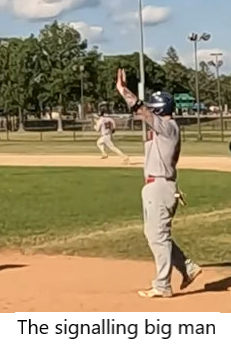
Genrich: Or, if that signalling fails, a feral hog that is surrendering.
Schaefer: If we're talking worst case here, yes.
Genrich: Last clip. Here we're looking at you hitting a home run.
Genrich: Now it seems like the home run trot should be pretty straightforward. But as you tell us in your book, not so for the big man.
Schaefer: With a home run there is an adrenaline spike that puts the big man into his one rep max headspace. Next thing you know he's shoulder pressing the first baseman. And that's going to cause a brawl.
Genrich: I imagine there will be some resentment there, at least.
Schaefer: This is where the spirit animal comes into play. The big man needs to know what his spirit animal is. And he needs to know how to get into the headspace of that spirit animal.
Genrich: You go into that headspace in this video.
Schaefer: Turns out my spirit animal is the porpoise.
Genrich: And a porpoise is not going to be shoulder pressing anyone.
Schaefer: Few animals are capable of shoulder pressing a human. That's why we want the big man in his spirit animal headspace. In my book I show the big man how to get there.
Genrich: So in that home run clip, are we watching you circle the bases? Or are we watching a porpoise?
Schaefer: There is a video on you tube that does a great job exploring my headspace when I hit a home run. If you want to know where I go during my home run trot, watch that video. I'll send you the link.
Genrich: Great. I'll post it as part of this interview.
Go inside Mike Schaefer's home run trot headspace
Genrich: I know you want to get to the gym so we'll wrap this up. Best of luck with the book, Mike. And thanks for doing this interview. You're always a great sport with this kind of stuff. That's why you're my guy.
Schaefer: Do I have to be?
Genrich: We'll see you Sunday buddy.
Skeeters vs. Angels
2021 TCMABL 35+ Championship Game
Sunday, September 12, 2 PM
Big Willow Field
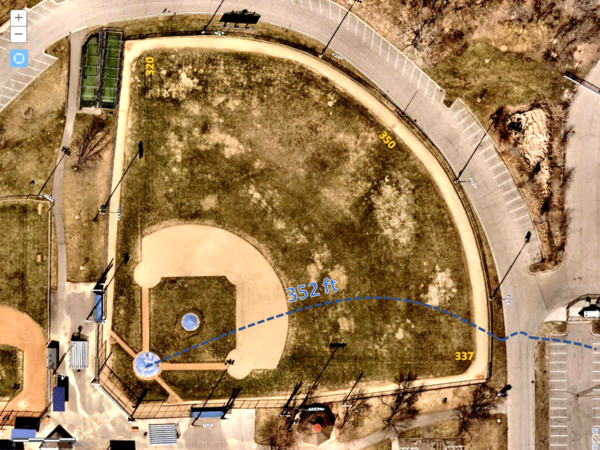
(With apologies to Ernest Lawrence Thayer):
Oh, somewhere in this troubled land the sky is full of clouds.
A dirge is playing somewhere, and somewhere heads are bowed.
And somewhere men are tearing up, and somewhere children pout.
Oh, somewhere in this troubled land the men refuse to hear
a post game consolation speech so full of dismal cheer.
“Now chin up boys, you did your best, they just did better still.
We’ll surely beat them come next time. You better bet we will.”
Oh, somewhere in this troubled land a cold north wind sweeps in.
A curse is uttered somewhere, and somewhere moods are grim.
And somewhere men are frustrated, a loss that can't be reckoned.
But there is joy in Skeeterville – the Skeeters won their second!
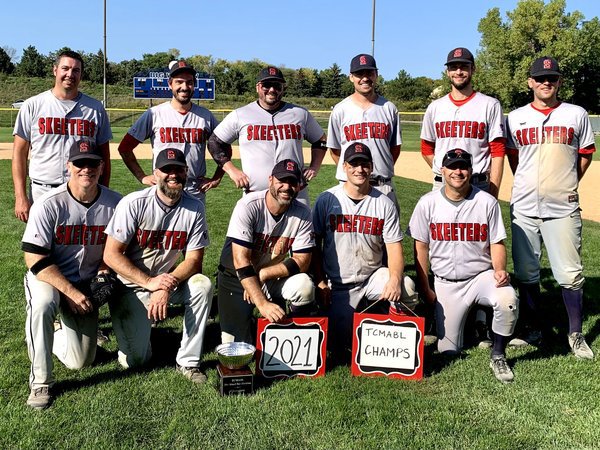
Skeeters vs. Knights
Sunday, July 8th, 2021. 5 PM
Stan Cyson Field at Northeast Athletic Park
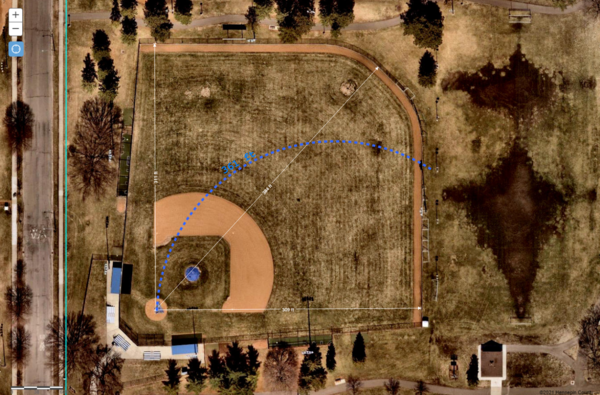
As reported by: Casey Johnson
Opening Scene: The Skeeters took to the field in the top of the first. It was quiet, but there had been reports that the Knights were nearby. No one could see them through the brush so we listened for noises. Suddenly, Crack! We heard something towards the direction where Dan was stationed. He buzzed in to get a closer look and found a ball had been sent in his direction, but the enemies coordinates had been miscalculated….They had come up well short and would need much more gun powder to once again successfully take out our 3rd buzzman and his lower lip. We then discovered the gunman had relocated 90’ east. It was too late to retort. Several more attempts were made to breach the Skeeter infield, but there was little reason for concern, these attacks were not close to home…so we waited.

Later: However undetectable the attack on our soil, soil rich in grass growing nutrients, our captain had sensed it may be too late for us. He took to the podium in our barracks suggesting the freedoms we’ve come to know might be compromised. We would be required to attend a meeting with him if things did not change. Things we wondered? Confused we murmured with a buzz before our captains protégé un-Corc’d with, “Yes, things like….momentum.” We came to learn that momentum is a Physics term and this momentum could be the recipe to a new way. The protégé grabbed his stick and started to explain the momentum to us. As he walked out to the presenters stage he swung the stick with a violent and beautiful lag and CRACK! But this time the Crack sound was louder…..and closer…..and suddenly we saw the lights, errr the Knights. All along this group of opposition has been hiding in plain sight. It was now clear to us what we needed to do. Inspired by the visual of this Cannon Ball like momentum change one Skeeter after the next strapped on their helmet to blast off in attack of the Knights.

In the end: Inspired by our new way, there would be only one more option on the table for the Knights defense. The Skeeters plated the go ahead run in the bottom of the eighth. As the rains fell upon the thick fields an attempt at truce would be made.
The Knights surrounded the most vulnerable Skeeter they could find until he pleaded with them to accept a “Tie”.
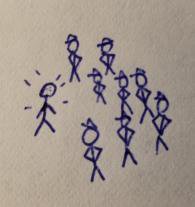
And so, with one more momentum blast 2 Skeeters burst from the dugout like they’d been shot out of a cannon to rescue the out-numbered Skeeter and 3 Cannonballers returned to the dugout in Victory.
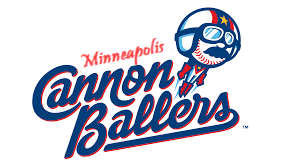
--Casey Johnson
Skeeters vs. Angels
Sunday, June 13th, 2021. 5 PM.
Stan Cyson Field at Northeast Athletic Park

Tom Genrich studied the home run diagram created by Rob Jones, the Skeeter first baseman. Yes, Tom Corcoran had hit an impressive home run. And it was more impressive still for having been hit off of John Barbella, one of the all-time TCMABL greats who was still dominating hitters in the TCMABL 35+ division.
But 528 feet?
The Skeeter manager frowned. A cat sat a foot away from his keyboard. It stared at Genrich unblinkingly. Genrich wished it wouldn't do that. It was unnerving. But not as unnerving as Corcoran's home run had been. Upon rounding third, Corcoran had sought out Genrich in the dugout. "That's a writeup, Tom," he had shouted, maintaining eye contact a beat too long.
Despite the oppressive heat, Genrich had felt a chill. Here was a warning, delivered with the calculated inflection of a fellow who had taught English in Japan, and also the brooding menace of a fellow who had studied the ways of the Samurai whilst teaching English in Japan.
Corcoran was a fan of the Skeeter home run writeups. He was also aware that Genrich was reluctant to continue these writeups now that Corcoran had joined the team. They were difficult to write. As such, the tradition relied on the fact that Skeeter hitters hit very few home runs. Tom Corcoran was not a typical Skeeter hitter. In Corcoran's first season in the 35+ Federal league, Genrich had witnessed Corcoran emerge as a Ruthian figure, hitting home runs at an unprecedented pace while setting the single season home record in just over half a season.
"You're better than any player I ever had," Genrich had told him when handing him the Skeeter jersey. "And you're the best god damn hitter I ever saw. Suit up. But don't expect any writeups."
Evidently Corcoran had heard him loud and clear. Evidently he decided Genrich needed a push.
"That's a writeup, Tom," he had said. Or else.
Now Genrich wondered: Had Rob Jones picked up on that implicit or else? He looked again at the home run diagram. Was this generous charting Jones's attempt to stay out of Corcoran's crosshairs? That seemed possible. If there was another Skeeter who would detect this or else signal, it would be the guy built like one of those radial TV antennas that sat atop roof tops before the age of cable.
But how might this or else manifest? While driving home from the field that Sunday, Genrich had considered the possibilities. When Mount Vesuvius had erupted in A.D. 79, citizens of Pompei had been buried underneath clouds of superheated ash. Could Corcoran, a high school teacher, steal into Genrich's back yard and achieve a similar effect with a baking soda volcano?
Maybe if Corcoran were a chemistry teacher. Corcoran taught physics. But did that make him any less dangerous? Genrich had visited Corcoran's basement and had seen a workout area, a pitchers mound, and a climbing wall. Had he missed a centrifuge? But then if Corcoran were creating fissionable materials for a nuclear missile, wouldn't he use it against a more longstanding nemesis? Like someone in the camp who argued that RBIs should be taken seriously as a baseball metric?
What about his board game acumen? Corcoran had been, and possibly still was, a nationally ranked Settlers of Cataan player. But then if it seemed remarkable to Genrich that there acually should be a national ranking of Settlers of Cataan players, it seemed more remarkable still that Corcoran should humiliate him in some national Cataan tournament given that he, Genrich, had never played the game and had no plans on entering that competition circuit anytime soon. So he seemed covered there.
What about something more frontal? Like a leg sweep? Here Genrich had paused. The man was undeniably athletic. And yet his was a physique made for the Professional Bowlers Association. Still, was it possible that this man of singularly unique talents hadn't mastered a singularly unique combat skill? Perhaps one from some far Eastern school? And also one that incorporated his predilection for the bare foot?
Genrich had pictured Corcoran across from a Sumo opponent. Corcoran's opponent outweighed him by two hundred pounds. Corcoran leaned in for the grapple, then folded into a forward somersault, deftly dropping and rolling between his opponent's legs. His opponent grimaced as Corcoran's toenails raked his undercarriage. Then he doubled over. The devastating frictive effects of the Spider Tack coating Corcoran's toes took its toll as the disconcerting sound of ripping velcro reverberated across the arena.
But this was an absurd worry. As with the Cataan gambit, a Sumo-infused assault could find no purchase in his life. By the time he had arrived home that Sunday night, Genrich had decided that the writeup could be ignored. He could parry anything Corcoran would throw at him.
He would change his mind just a few days later. He was rounding the corner of the dugout for a Federal League game when the diminutive Leo Corcoran, Tom Corcoran's youngest son, came flying at him low and crooked, like a Scud missile. In the guise of a hug, he head-butted Genrich's genitals. Genrich swallowed the yip of a small dog, vowing to sound it later. Later that same game, he had watched with a mixture of fascination and dread as Teddy, a second diminutive Corcoran, ate dried seaweed with the stoic psychopathy of one of Hans Gruber's Tuetonic henchmen from the first Die Hard film.
And then there had been the conversation surrounding Eleanor, the Corcoran fetus. "She'll go by Elle," Corcoran had told him.
"Elle, as in the acronym for Extinction Level Event?" Genrich asked. He smiled weakly.
"Indeed," Corcoran said. He turned to Genrich with a fixed from under stare. "But for whom?"
At that moment, Genrich had decided that Tom Corcoran better get his writeup after all.
And now he sat in front of his computer, waiting for some inspiration, hoping for a narrative hook to emerge. He did know that whatever he wrote, he would have it accomplish three things. First, he would have it introduce this extraordinary Corcoran character to his Skeeter teammates. Second, he would have the effort serve notice that the team might expect more modest writeups going forward. Finally, he would have it be entertaining to read.
This seemed like his toughest writeup yet. Probably he would have to settle for two of the three. That would have to do.
Genrich leaned over his keyboard, winked at the cat, and began to type.
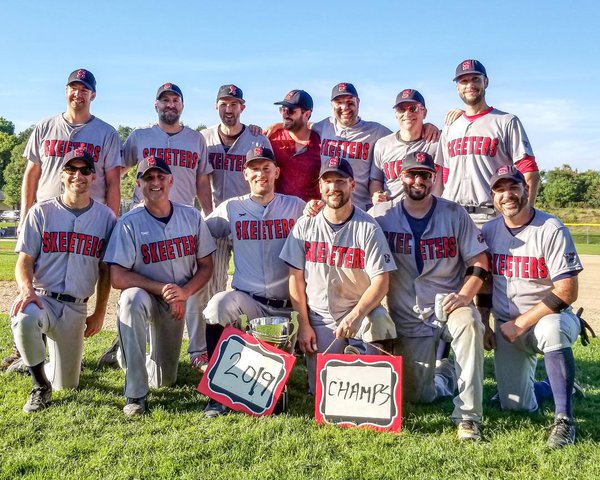
the incomparable Phil,
Who expertly sprays hits
And robs them at will.
B is for Bob,
Ol’ “Lock ‘Em Up” Gordon.
The strike zone’s the jail
And he is the Warden.
C is for Casey
And his beloved Gramp
Who knew that one day
The kid’d be a champ.
D is for Dietz,
Whose swing gives us life.
(If you believe what he says,
E’s for his wife.)
F is for Fenton,
The sweet-swinging Seth.
To rolling things, he is
Known only as “Death.”
G is for Genrichs,
Those bombastic brothers.
Co-MVPs,
If mom had her druthers.
H is for Hollers,
And Hard-Hit line drives,
The crack of the bat,
The stinging high fives.
I is a season
Free of Injuries.
(Dan’s face, I’m sure,
respectfully disagrees.)
J is for Jeff,
And though we’ve seen fleeter,
He’s surely deserving
Of “Most Improved Skeeter.”
K is for Strikeout,
by call or by swing,
When viewed from the field
It’s a glorious thing.
M is for Mike
Our masher of dingers
Rivals tremble (their wives too)
To behold such a swinger.
N is for Nate,
Our dependable 2.
I wouldn’t want that guy’s job…
Would you?
O is for Outs,
Those sumptuous treats.
P is for what
That meth head said he eats.
Q is Quixotic,
For that was our quest.
Our windmills were Dodgers,
And Knights, and the rest.
R is for Rob,
First-baseman, clutch hitter.
Remember when Casey
Photoshopped him on the shitter?
S is for Skeeters, of course,
As it oughta,
Who finally feast
On the whole enchilada.
T is for Tom,
Our fearless commander
To trophies, as to fly balls,
He’s known to meander…
But U is for Undeterred,
For surely he’s that.
And it couldn’t have happened
To a classier cat.
V is for Victory
O’er good teams and schlubs.
(A minor digression here, but
W is for Wangler,
And the Wins he accrues.
When Ken toes the rubber,
The Skeets never lose.
X is “Xstatic,”
That foreign sensation
Heretofore unbeknownst
To Skeeters nation.
Y is for You,
For not being a schmuck.
And for the phrase,
“You like that, ya fuck?”
And Z is for Zeroes,
Your number-one fan,
Be he in right field
Or, sometimes, the stands.
2021 addendum:
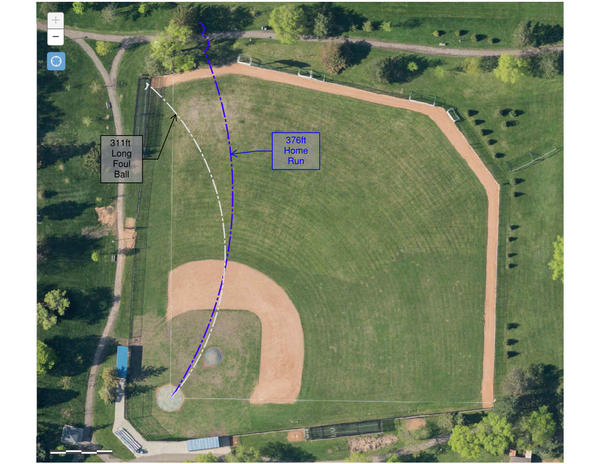
Skeeters vs. Voyageurs
Playoffs. Saturday, September 8. 2018.
Tom Genrich fulfills a lifelong dream
As reported by: Nate Serr
Please excuse the crudity of this entry. I didn't have time to build it to scale or paint it.
But seeing as how our fearless leader couldn't be expected to write up his own heroics, this is all you get.
Tie game.
Bottom of the 9th.
2 outs.
Winning run on second.
No doubt stinging from the intentional walk issued immediately prior, longtime Skeeter "Manager" Tom Genrich dug in at the plate. With a newfound ability to go opposite field, Genrich dropped a feeble swing on an outside pitch and shot it to right. As the ball squeaked over the first baseman's head, Genrich was no doubt thinking he had just gotten his first walk-off hit since middle school. Genrich skipped toward first base like the giddy school boy he actually was the last time this had happened.
FOUL BALL! came from behind home. Apparently the chalk line is no longer in play. Dejected, Genrich trudged back to home plate with the depressed lack of confidence we've all come to know and expect. Surely, after such a demoralizing turn of events, there was no way he could do it again. The dugout all sat back down and grabbed their gloves, preparing for extra innings.
But the very next pitch Genrich turned on one and sent a groundball up the middle. The centerfielder came up gunning, but Skeeter speedster Rob Jones made sure the grounder would not be in vain, even adding a half-barrel roll slide to finish it off.
Genrich made it down to first where he was eventually dog-piled by no less than two fellow teammates.
Following the victory, several teammates joined Genrich at a local eatery on the promise of free drinks for all. But apparently Genrich could only be counted on to deliver once on this day, as the waitress brought separate checks that would not be consolidated. This will undoubtedly be reflected in player contributions to next year's league fees.
Way to go Tom.
-Nate Serr
Skeeters vs Padres
Sunday July 17, 2018. 5 pm.
Rosetown Legion.
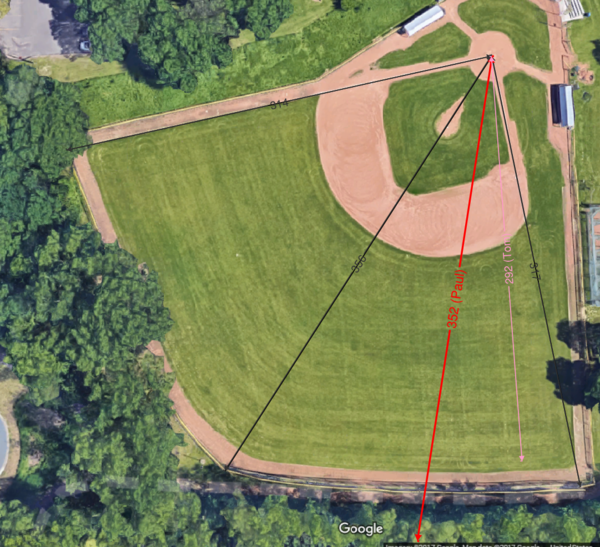
Compensation
Skeeter Paul Dieltz sidles up,
You swallow back a plaintive wail.
And from this brawny exposition
***
Former 18+ Indian Paul Dieltz joined the Skeeters this year after many years out in California swinging lighter bats against faster pitching. On Sunday, Paul launched a moonshot worthy of an actual Apollo astronaut or some expendable dachshund tricked out in a spacesuit and riding an experimental rocket into oblivion, take your pick. Upon returning to the bench, Paul reported his bat weighed 34.5 ounces.
The Skeeters love having Paul around and look forward to playing with him for years to come.
SKEETERS VS PADRES
SUNDAY, JULY 16, 2017. 5 PM
ROSETOWN LEGION

As the Padres batter approached home plate, Bob Gordon adjusted his cap. Despite the ninety degree heat, the Skeeter second baseman had barely broken a sweat. He watched the play of his elongated shadow on the infield. How he relished the similarity between that shadow and his new, elven figure. A figure that reminded him of someone in a movie. Probably he wasn’t going to be mistaken for Trinity from the Matrix. Probably. But didn’t he move like her?
Gordon crouched, then relaxed as the batter took the first pitch for a ball. The previous fall, Gordon had committed to a regimen that had promised a total body makeover. Intense Thighmaster sessions had blasted his thighs. A diet of boiled cabbage, baked beans, and canned prunes had melted away the pounds. Between the soreness in his thighs and some extreme gastrointestinal discomfort, Gordon shuffled around with his lower half in a state of perpertual tension. He called his program “The Clench.” It proved remarkably effective. But also dangerous. Once, when an ominous rumble in his stomach put him in the mind of a sentient headpin contemplating the approach of a well thrown sixteen-pounder, Gordon had clenched so violently he had displaced his coccyx.
The batter called time. Time. Time stopped for no man. Until he was in the hospital. There, Bob Gordon was astonished to learn that the only way they knew to immobilize a coccyx was to spread eagle a man on his belly, fit his wrists and ankles into straps, and hoist him into the air as if he were going to be quartered. Thus suspended like a tortured spider crab, Gordon was visited by intimations of his own mortality. And with those intimations came the realization that bucket list items once so important to him now seemed trivial. Geoengineer a planet. Reanimate the dead. Master the tuba. One by one, items fell from his list. Just one remained in the end.
The batter dug into the box. That last bucket item rarely left his mind. Though his wife and daughters gave his life some purpose, he craved a validation that could only come from something else. He wouldn't rest until he saw himself prominently featured in a Skeeter writeup.
The batter fouled a ball back. Behind Gordon, the man responsible for those writeups was muttering incoherently. The Skeeter centerfielder had ended their half inning with a pop out. Now Gordon heard him say to no one in particular “I should have hit that pitch.”
The second baseman shook his head. Did this man ever stop fixating on his mechanics? And how could his mechanics be so bad when he spent so much time hitting baseballs off of tees? Or off of items, lifted from construction sites, that could stand in as tees? Gordon remembered watching this middle-aged, profusely sweating teammate stream profanities as he mishit baseball after baseball off of an orange traffic cone. That was the first time Gordon thought there might be something wrong with the man. And as with the man, so went his write-ups: It seemed to Gordon that these efforts were becoming increasingly unhinged.
Gordon glanced over at the Skeeter third baseman. One had only to regard the absurd treatment given to Mike Schaefer’s prodigious home runs to wonder whether ridicule would be one's reward for doing something spectacular on the field. And yet … surely he could count on a due deference. He was, after all, a TCMABL board member --
The batter made contact. A pop flare, headed his way. Gordon peddled back, then spun around, the quickness of his pivot making for a perfect technique. But also the possibility that it had been too quick for his teammates to notice the perfection of the technique. He resisted the urge to pirouette. Instead, accelerating into a sprint, he looked back, expecting the ball to appear over his right shoulder. By some unaccountable glitch in the matrix the ball was sailing over his left shoulder. With an effort that one year ago would have landed him the hospital, perhaps where they would have hung him by his big toes this time, Gordon stopped on a dime, twisted back towards the ball, and, falling backwards, threw out his throwing hand. The ball smacked his palm, then tangled in his fingers. Then it stopped. He had the ball. By god, he had the ball!
For a moment he heard nothing. Then, the whoosh of his teammates cheers enveloped him. Gordon stood motionless, transfixed by the ball in his bare hand. That catch should have been impossible. And yet there, in his hand, was evidence that he himself had just made that catch.
Gradually he began registering what his teammates were shouting. He heard something behind him. Gordon could hardly believe his ears. Then he heard it again, louder this time. Gordon smiled. Then he stifled a sob.
Later that evening, long after Mike Schaefer hit a home run that was the first grand slam in Skeeter history but that also lacked a dramatic import that might serve as a compelling narrative hook for Skeeter writeup purposes, Gordon replayed those words in his mind:
“Now there's a catch worthy of a writeup!”
SKEETERS VS MAVERICKS
SUNDAY, JUNE 4, 2017. 5 PM.
PEARL PARK
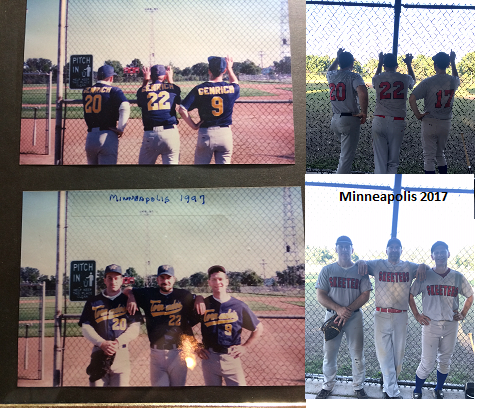
Twenty years ago, Dave and Dan Genrich attended what may have been the inaugural TCMABL player draft. The brother tandem was drafted first by the Tornados. After the draft, Andy Anderson, the Tornados skipper, was told of a third Genrich waiting in the wings.
Twenty years later in a Skeeters victory over the Mavericks, Dave Genrich came out of retirement and rejoined his brothers on the field. Judging by his day at the plate and his inning on the mound, his retirement may have been premature.
The only thing better than making brothers of teammates is having brothers for teammates. Thanks guys.
SKEETERS VS VOYAGEURS
SUNDAY, AUGUST 21 2016. 4 PM.
SCANLON FIELD

The day broke, and with it Barb Fenton’s water. Seth Fenton would be missing the game that afternoon. “This is the greatest day of my life!” exulted the Skeeter shortstop on social media, leaving his always short-rostered teammates to wonder whether Fenton was reacting to the birth of his son or to his finally getting a Sunday off. Meanwhile, Skeeter manager Tom Genrich seethed: Despite the disruptive impact of in season baby-having, here was yet more evidence that he himself was the only Skeeter mindful of the nine month gestation period and respectful of the team’s ban on coitus between the months of September and December.
Skeeters reporting to the field were dismayed to find parts of the field an impassable quagmire. In the swampy right side of the infield, a shaken Chuck Terhark discovered the fresh remains of a mule train. Phil Allen was startled to learn he would be sharing the batter’s box with a wallowing hippopotamus. Prairie-length infield grass would have tickled the buttocks of the Skeeter first baseman had the Skeeter first baseman been Peter Dinklage and not just a fellow who put up Peter Dinklage-sized numbers on the day.
Taken altogether, here was Divine Improvidence, acting in the guise of some monstrous baby boy/muddy suckhole transmogrification, mocking the very concept of Skeeter baseball on the 35+ level. And here was a Skeeter team that did not respond well to ominous portends. Who could forget the time Genrich was warming up in the bowling-lane sized bullpen at Frank Quilici field, only to see one of his curveballs sail over the side fence and hit a porta-potty? Certainly none of the assembled Skeeters that day. Probably not the umpire that day, who had vacated the biffy just moments before. Possibly not their opponents that day, who had pounded the Skeeters like a tent stake.
With all signs pointing to a loss this day, what the Skeeters really needed, in addition to surgically restored arms, league permission to again use aluminum bats, and of course a change in management, was someone to step up and do something epic. The sort of thing few Skeeters would have thought possible, or perhaps even desirable if the alternative was getting tenned in seven and getting to go home early.
Enter Mike Schaefer. In an ode-worthy performance destined to be recounted with gusty, German beer hall enthusiasm at future Skeeter parties, Schaefer led the Skeeters to victory with a double and two towering home runs. The home runs silenced whispers that Schaefer’s long homer drought signaled the beginning of a decline. They also found Genrich muttering “Shit, now I have to do another writeup.”
Addendum: Home run diagrammer Rob Jones has discovered that the pitchers mound at Scanlon field is six inches closer to home plate than the regulation 60 feet, six inches (see diagram).
Physics tells us that a pitch delivered closer to the plate will reach the plate going faster than the same pitch delivered six inches further away. Those same physics tells us that when hit with the identical swing, a faster pitch will travel further then a slower pitch.
The resultant question, while painful to acknowledge, is unavoidable: Would the two home run balls have gone as far (i.e. cleared the fence) had the pitches been delivered from sixty feet, six inches instead of sixty feet? Without knowing the pitch speeds or the barrel velocities in question, physics must remain forever silent on the subject.
Powerlifting Skeeters who began hyperventilating at the mention of this discovery or the challenge it poses to the legitimacy of the two homer performance are encouraged to take up the issue with Rob Jones directly.
Skeeters vs. Lake Monsters
Sunday, August 9, 2015. 5 PM.
Patrick Henry High School
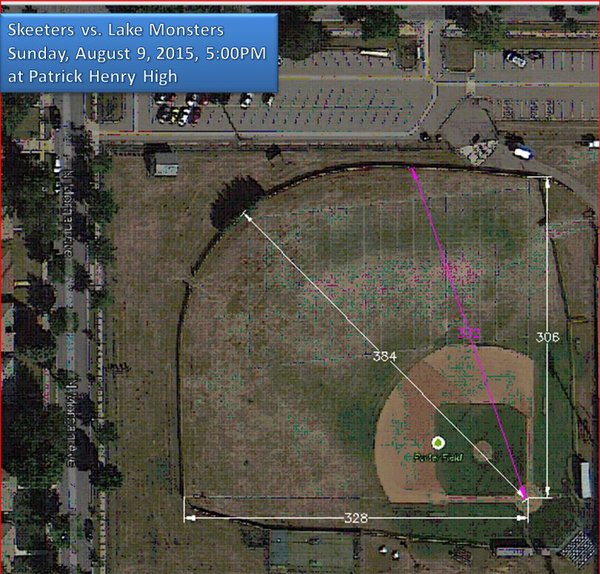
Much has been written about Mike Schaefer of late. The public can safely ignore most of it. Mike!, a sensationalized account of Schaefer’s rise from the “mean streets” of suburban Denver to TCMABL prominence, collapses beneath the pretense that Schaefer has achieved the fame of a Madonna, a Barney, and other celebrities known only by their first names. Another tabloid-quality work, the wince-inducing I've Got Your Hard Mike Right Here, explores a purported intersection between Schafer's hard lemonade habit and his profane bench chatter. Readers looking to his published journals for an introspective Schaefer will be sorely disappointed: the 400 page Schaefer on Schaefer never once strays from the topic of why he shouldn’t have to catch.
More difficult to ignore, and if possible even more disturbing than the anatomically exaggerated doodles that litter Schaefer’s published journals, are the rumors swirling about social media. That Schaefer regurgitates his food. That Schaefer stomps and snorts when his girlfriend folds red bath towels. That Schaefer bellows plaintively, and occasionally with window-rattling violence, during lovemaking. And yet judging by his home run on Sunday, his third of the season, the rumors may be true. Mike Schaefer may be injecting himself with performance enhancing bull hormones.
Fortunately for the slugger, and also for a Skeeter team that increasingly relies on Schaefer to elevate their offense from pathetic to merely laughable, the TCMABL’s drug testing policy lags far behind the other major sports.
Skeeters vs. Mets
Sunday, July 19, 2015. 5 PM.
Greenfield Park

Few fields in the TCMABL can contain Mike Schaefer. Greenfield park is not among them. As righty Tom Genrich’s jaunty talk of “going oppo” gave way to the grim realization that one must be able to hit a ball to right field in order to hit a ball over the right field fence, lefty Schaefer stepped into the box and made short work of the 240 foot right field porch. While some Skeeters questioned whether Schaefer got all of it, everyone could agree that the poke would have made it out of most other little league parks in America.
Shaefer continues his assault on the Skeeter record book. Which doesn't actually exist in any physical form. Although if it did, and as anyone familiar with Skeeter management will tell you, it would be the illegible scrawlings of a golf pencil on a badly mauled strip of cardboard. At any rate, in just 60 career at bats Schaefer became the first Skeeter to enter the three home run club. For long-time Skeeters who can count on two, one or zero fingers the number of home runs they have hit in eight times as many at bats, the record setting shot was a reminder that they are just not very good at the game of baseball.
The Skeeters jumped out to a five run lead in front of their wildly supportive and no less tipsy fan base, for whom even the most routine of groundouts was a “great hit!” And then the Mets ten run sixth sounded like the drawn out wail of a trumpet in some minor key. Perhaps the worst single-inning collapse in Skeeter history found faces slowly draining of blood, a sensation made doubly unpleasant by being experienced both figuratively via the on field massacre and literally when a horde of mosquitoes descended upon their uniformed Skeeter brethren in a cannibalistic frenzy. “I didn’t pay for this,” exclaimed first baseman Rob Jones, despondent or perhaps delighted by the realization that with team fees still uncollected, at least he wasn’t paying for the beating, technically speaking.
A Monster Shot Meets the Rice Creek Bigfoot
Last night at Irondale High School in a close contest against a talented Dodgers lineup, Mike Schaefer ripped an 0-2 pitch an estimated 370 feet over the right field fence. Mike, who teammates call “Big Mike” because he is big and his name is Mike, hit a home run earlier in the day for the 18+ Indians. If his line drive morning home run was remarkable for the fact that it never rose as high as the somersaulting bat flip that accompanied it, his homerun last night was notable for the punctuating grunt that rattled windows as far away as Shakopee.
Some Skeeters reported hearing a second grunt as the ball disappeared into the swamp beyond the right field fence. While everyone agreed that here was a vocalization from the Rice Creek Bigfoot, up for debate was whether the beast was angry over being struck by a baseball or simply curious after mistaking Mike’s grunt for a mating call. In either event, the potential result – two tons of enraged or possibly aroused skunk ape crashing through the right field fence – had Skeeter rightfielder Chuck Terhark professing concern about returning to his position and playing with his back(side) to the fence.
A Grand Entrance, and Echoes of '61?
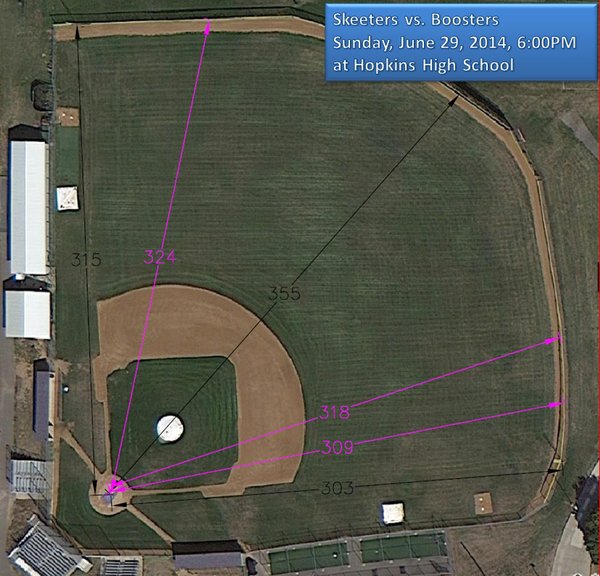
In a related development, the long and athletic Rob Jones, who was referred to as "Strawberry" by the umpire after the game, and Tom Genrich, who bristles at the Kurt Bevacqua comparisons, both hit their second home runs of the season. The matching blasts stirred up long dormant echoes of Mickey Mantle and Roger Maris and their race for 61 home runs in 1961.
Though Jones has been issued a permanent red light on the basepaths, like all of his teammates he regards such managerial edicts as "recommendations". Likely he will look for an opportunity to steal his second base of the campaign in his quest become the first Skeeter to go 2/2 in a single season. Meanwhile, the 44 year old Genrich, who has been waiting some twenty years for his doubles power to mature into home run power, inexplicably drives a 2001 Mazda MPV minivan though he has no kids.
Genrich Homers and Noone Notices
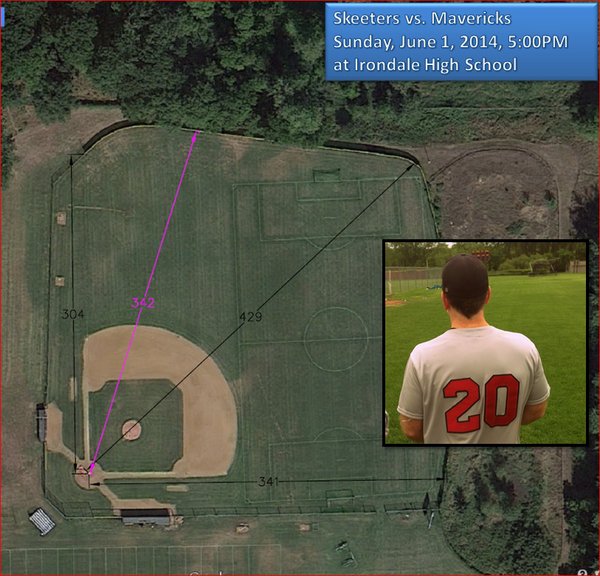
A couple weeks ago, Tom Genrich returned to the dugout claiming that he had just hit a homerun. The Mavericks didn't seem to dispute his claim. Tom now has one (1) career homerun.
Later that night, he celebrated.
-Rob Jones
Rob Jones Goes Rob Hobbs, Knocks Out Light
Last night at Patrick Henry High School, first baseman Rob Jones, who came into the game with just 10 xbh across 400+ plate appearances, belted a home run into a light stand beyond the right field fence. The blast traveled an estimated 348 feet before smashing into and knocking free a light casing some 30 feet off the ground. Jones, who hesitated between first and second as if wondering where the sparks were, finished his home run trot amid the disbelieving whoops of teammates transported into a state of hilarious awe.
Suggestions for what to do with the mangled light casing (pictured above) ranged from wearing it suspended from the neck Flavor Flav style to requiring that Skeeter manager Tom Genrich wear it like a lampshade at future team parties.
Later that evening at the 331 Bar in northeast Minneapolis, some perspective was restored when Rob Jones had to explain to confused Art-A-Whirl patrons that yes, the Skeeters are an actual baseball team and that no, he and his still-uniformed teammates weren't some kind of roving performance art piece.

